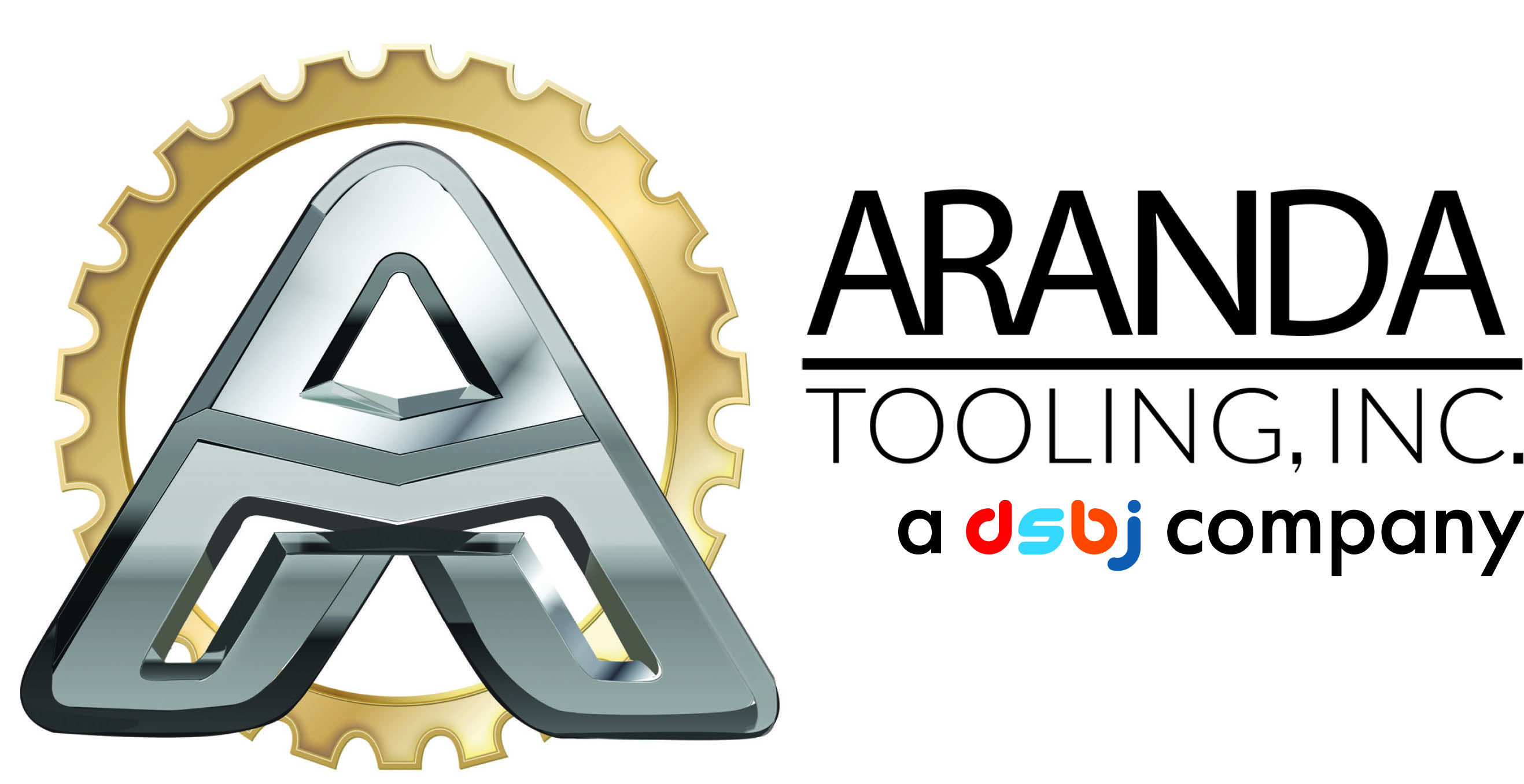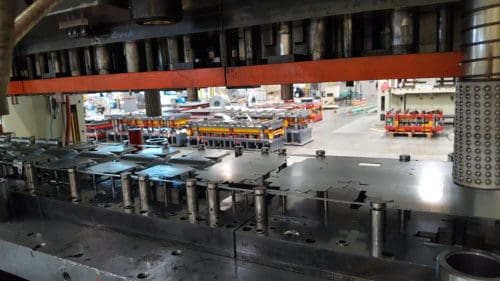Aranda Tooling manufactures metal products for a wide range of industries, including medical, manufacturing, energy, automotive, and home improvement. As a superior metal fabricator, we specialize in high-volume stainless steel stamping and provide extremely complex custom stainless steel parts for customers around the world.
Stainless Steel Stamping Capabilities
Aranda Tooling’s modernized facilities include a portfolio of more than 50 punch presses with up to 1,300-ton capacity. Our presses can manufacture up to 500,000 parts per day within extremely tight tolerances through the use of fully automated robotic transfer mechanisms and in-die sensors. We manufacture stamped metal parts from 0.005” to 0.5” thick with widths up to 48”, and our largest press bed processes components up to 240” x 70” with up to 1,300 tons of pressure. Aranda’s hydraulic presses possess a maximum press stroke of 18”, and our mechanical presses have a press stroke of 31”, which allows us to fabricate components of almost any size.
Advantages of Stainless Steel Components
Corrosion Resistance
One of stainless steel’s most valuable characteristics is its resistance to corrosion. Stainless steel alloys include chromium, which interacts with atmospheric oxygen to create a protective layer of chromium oxide. This layer protects the iron in the alloy from rust-causing oxygen exposure and provides a surface that is resistant to corrosive chemicals. Due to its smooth, unblemished surface, stainless steel is easy to sterilize, making it a favorite material for medical equipment and devices.
Strength
Stainless steel has a high strength-to-weight ratio, which makes it useful for components that require a strong material with high corrosion resistance. Stainless steel can maintain its strength even in extreme temperatures, and certain alloys can be relied upon to withstand heat up to 2000°F.
Recyclability
Stainless steel frequently incorporates melted scrap metal, which reduces fabrication costs and allows for more environmentally friendly processes. It is also 100% recyclable, lowering overall product waste and making it an eco-friendly material.
Applications
Due to its high tensile strength, corrosion resistance, sterile surface, and appealing aesthetic, stainless steel is highly desirable for a variety of applications. Common uses of stainless steel include:
- Surgical instruments
- Components for the energy industry
- Industrial components
- Commercial components and parts
- Medical equipment and surfaces
- Construction hardware and components
- Automotive components
Various grades of stainless steel have been developed to tailor the material’s characteristics to meet the specific needs of many different applications.
Common Types of Stainless Steel
Stainless steel comes in more than 100 grades, each of which has a specific blend of iron, chromium, molybdenum, nickel, and other metals to enhance certain properties. Below is a summary of the most commonly used stainless steel grades.
301 Stainless Steel
301 stainless steel is an austenitic stainless steel that is corrosion-resistant. With a composition of 17% chromium and 7% nickel, it’s ductile and strong, making it a good choice for cold working. It has a high strength-to-weight ratio and is common in drawing, forming, and welding. Its applications include aircraft structural parts, automotive parts, utensils, and conveyor parts.
304 Stainless Steel
304 stainless steel is the most common stainless steel. It is primarily iron with 16-18% chromium and 8% nickel, which gives it formability and weldability while retaining superior corrosion resistance. It is frequently used for appliances, food processing equipment, cookware, mechanical parts, and production equipment.
316 Stainless Steel
316 stainless steel, also known as marine-grade stainless steel, exhibits greater corrosion resistance and temperature resistance than 304 stainless steel, due to a higher proportion of nickel and molybdenum. It is regularly used for components in marine applications where equipment is exposed to corrosive aquatic conditions.
321 Stainless Steel
321 stainless steel is a titanium stabilized austenitic stainless steel with corrosion resistant properties that are similar to 304. This option is typically used in temperature ranges between 800-1500° F since it’s stabilized against chromium carbide precipitation with the added titanium. Common applications include piston engine manifolds for petroleum processing components, and thermal oxidizers for waste treatment.
430 Stainless Steel
430 stainless steel is notable for its exceptionally high chromium content of 16-18% with very little nickel. The material is more magnetic and more chemically resistant than 316 stainless steel, and is commonly used for automotive components and exteriors; however, it can become brittle in extreme temperatures.
420 Stainless Steel
420 stainless steel has a lower chromium content than 430 stainless steel, at 12%. The reduced chromium content results in stainless steel that is harder but less corrosion resistant. It is ideal for products that require hardness but offer little exposure to corrosive elements or extreme temperatures, such as kitchen knives and surgical implements.
Superior Metal Stamping Services From Aranda Tooling
Since 1975, Aranda Tooling has been a premier provider of metal stamping, laser cutting, and metal fabrication services. Our ISO 9001:2015 certified facilities employ experienced and knowledgeable industry experts from around the world. In addition to our exceptional stainless steel stamping services, we offer a wide assortment of design and fabrication services. Our primary services include:
For more information on Aranda’s metal fabrication services, contact us today or request a quote.





 Request For
Request For
